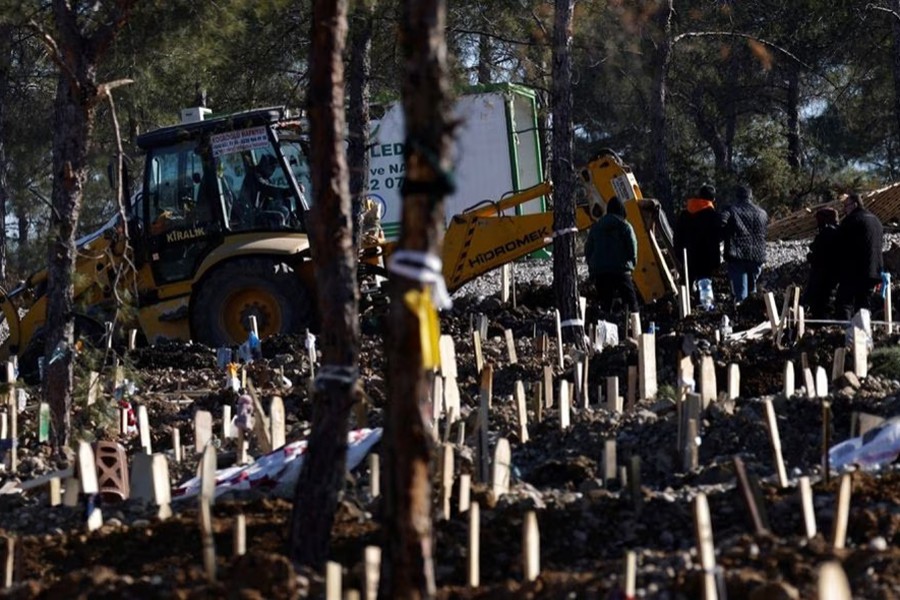In the Turkish town of Pazarcik, a soccer pitch has been turned into a burial ground for people killed by the earthquake which struck 11 days ago. The goal posts are still standing but the field is dotted with about 100 dirt mounds and ditches.
Each freshly dug grave is topped with a wooden plank marking the same date of death - February 6, 2023 - when this town was devastated by the deadliest earthquake in Turkey's modern history, reports Reuters.
"We waited...for 10 days to get the bodies of the deceased from under the rubble," said Huseyin Akis, who was burying his niece along with her husband and two sons.
A red scarf had been wrapped around the wooden plank at a nearby grave. Pine branches had been scattered over another.
The scene in Pazarcik, epicentre of the quake that struck in the dead of night on Feb 6, captured the struggle facing people trying to find and bury their dead since the disaster, which has killed more than 43,000 in Turkey and neighbouring Syria.
At a graveyard in Kahramanmaras, thousands of new graves vastly outnumbered those which predated the earthquake, underlining the scale of the catastrophe.
Tents had been erected to perform Islamic burial rituals, and to wrap the bodies in a shroud. Empty coffins, sent from all over Turkey, were piled high. A Muslim cleric stood ready to perform the rituals.
People carried bodies in bags towards graves. The sound of prayer recitations competed with the noise of excavators digging more ditches in the distance.
'10,000 BURIALS'
According to Islamic traditions, the dead should be buried as quickly as possible, if not immediately.
Speaking at the Kahramanmaras cemetery this week, the deputy head of Turkey’s Religious Affairs Directorate described the difficulties in burying bodies recovered from the rubble, noting their condition sometimes meant rituals must be adapted.
"No one should think that what is necessary is not being done. Look here: our friends carried out around 10,000 burials. It is not possible to spend hours on each one, so the process is carried out in a sped up way," the official, Burhan İşleyen, said in an interview with Turkish broadcaster A Haber.
Authorities have grappled with the problem of retrieving bodies and preparing them for burial since the earthquake, said Bulent Tekbiyikoglu, the governor of the city of Kirikkale, who was on a visit to Pazarcik.
Ghassals - who prepare bodies for burial in accordance with Islamic rituals - had been working "in rotation as hundreds of bodies piled up at once", he added.
Some families have worked with crime scene investigators to identify their dead relatives.
At another cemetery in the town of Pazarcik, hundreds of people gathered for the funeral of Ismail and Selin Yavuzatmaca and their two young daughters.
They were among hundreds of people believed to have died in a building complex called the Ronesans Rezidans, or Renaissance Residence, when it collapsed in the city of Antakya.
Ismail Yavuzatmaca's cousin, Ferhat, said he had loaded them into his car and brought them to Pazarcik for burial after identifying the bodies.
“This should have been the fate of the Ronesans contractor, not of Ismail!” yelled one woman during the funeral.
“You loved my cooking. Ask for any meal you want, I’ll prepare it for you right now,” the woman said, kneeling at the grave, her knees muddied as she stroked the wet earth.
Many people are still waiting to find the bodies of their relatives. On Friday, thousands across Turkey participated in symbolic funerals for the dead who were still under the rubble.
"If we stay at home and listen to ourselves, we will never recover. There is no point in looking back," said Ahmet Akburak, who has buried seven relatives, speaking outside a Kahramanmaras mosque. "We are glad we were able to get their bodies out. A lot of people became one with the debris."


